to hold two opposing ideas in mind at the same
time and still retain the ability to function."
- F. Scott Fitzgerald
Agile frameworks empathize empowered teams, flat structures, and meritocracy. Team members and those in supporting roles are expected to earn trust and respect, rather than get authority based on org chart.
Organizations in general do not work this way. A modern organization is all about hierarchy, where authority comes from one’s position and place on the chart. Responsibility and decisions each travel in exactly one direction in the hierarchy: decisions come down, responsibility goes up. This kind of structure is easy to manage from the top. But it does not lead to best decisions.
An Agile team is encouraged to take control of, and responsibility, their own work, but it comes in direct conflict with the not-so-Agile organizational structure. Entire corporate cultures are built around deferring to someone with a higher title. Those cultures do not disappear when an authority figure up the hierarchy decides that some projects should try Agile.
People on an Agile team are taught to care about producing value, make their own decisions, and take responsibility – but for employees with years of experience in traditional organizations it is not easy to accept this kind of message at face value. It is even harder if Agile has a narrow mandate, for example, when transformation is happening only in a small part of organization.
This cultural shift is the hardest and the most painful part of a large-company Agile transformation. It is also the most valuable change a business can make to improve its culture.


Great article - and great image! :)
ReplyDelete